Vaughn Lore #2: The Process and The People
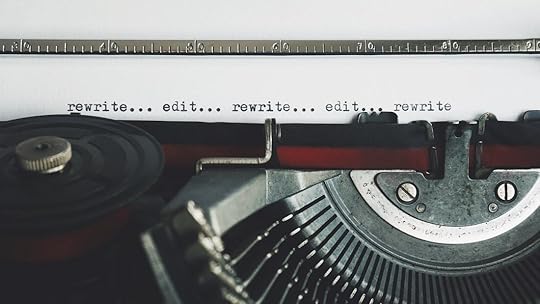 So I really enjoyed last weeks format where I tell you guys a bit about me as a writer, while also taking a moment to thank the people who have helped me along the way. I think it worked, and thus, I am doing it again. Now, every writer has a process. Some are more clearly defined, and others are a bit more slapdash, but it works for us. So this is my process, and the people involved in it. They'll know who they are, but I don't want to throw their names out there without permission, so I'll refer to them by what they do to help me. It takes me a while to finish a rough draft. I'm not Stephen King, I can't write 5000 words in a day (and believe me, I've tried). My upper limit is around 3K and that will take me literally all day, something I can't afford often while maintaining my full time job. So even if I could write 5000 words a day it's not sustainable. I tend to aim for about twelve hundred, which oddly enough I can usually pull off in around two hours. So that's my projected daily word count, but as long as I hit in that general ballpark I feel successful. I find that too rigorously holding myself to an absolute word count sets my wheels spinning but gets me nowhere. While I love the concept of NaNoWriMo, I find the structure and the timing of it just place extra stress on my writing and after having done it three or four times with only one official victory, I learned that it may just not be for me, at least in its default form.
So I really enjoyed last weeks format where I tell you guys a bit about me as a writer, while also taking a moment to thank the people who have helped me along the way. I think it worked, and thus, I am doing it again. Now, every writer has a process. Some are more clearly defined, and others are a bit more slapdash, but it works for us. So this is my process, and the people involved in it. They'll know who they are, but I don't want to throw their names out there without permission, so I'll refer to them by what they do to help me. It takes me a while to finish a rough draft. I'm not Stephen King, I can't write 5000 words in a day (and believe me, I've tried). My upper limit is around 3K and that will take me literally all day, something I can't afford often while maintaining my full time job. So even if I could write 5000 words a day it's not sustainable. I tend to aim for about twelve hundred, which oddly enough I can usually pull off in around two hours. So that's my projected daily word count, but as long as I hit in that general ballpark I feel successful. I find that too rigorously holding myself to an absolute word count sets my wheels spinning but gets me nowhere. While I love the concept of NaNoWriMo, I find the structure and the timing of it just place extra stress on my writing and after having done it three or four times with only one official victory, I learned that it may just not be for me, at least in its default form.So that's what I do for my rough draft. I try to write just over a thousand words a day until it's done. Barring any extra chaotic circumstances (vital elections, family crises, cats laying on my keyboard looking too cute to move) I can finish the draft of a short novel in two months. "Can" being the operative word. It rarely happens that way. But it could! Anyway, counting circumstances, days where time is not on my side, and writer's block (yes, I believe it's a thing, but I do think beating it often comes down to an act of will, or an act of strategy. Regardless, sometimes it wins and I stare at the blank space on my document until my whole world is white and words aren't real anymore), let's say I start my draft and finish it in three-ish months. This is probably where I should mention that I am Lord Regent of the Pantsers, so if you ask me how I plan a novel, I will cry...and then laugh....and then
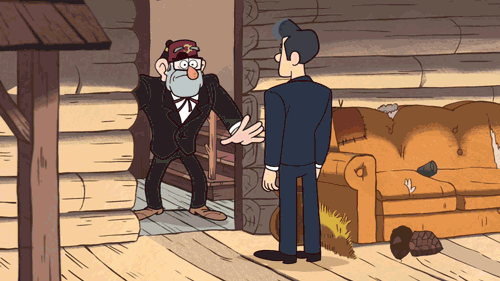 SMOKEBOMB! Outlines don't work for me. They suck the joy right out of writing. And I've tried them several ways at this point. So to back up, my "plan" for a novel is usually more of an elevator pitch (ie. The first human colony on Venus discovers an ancient alien artifact and accidentally wakes up the god of a lost civilization). That's it. That's the plan. "Well, how do you get a plot out of that?", you may ask. Honestly, I just think of what could go wrong in that short scenario. Is the god real? Venus is dangerous, right? Are these people desperate for something to believe in? And I come up with story beats as I go. Some stick, some don't. It's like throwing spaghetti at the wall to see if it's done.
SMOKEBOMB! Outlines don't work for me. They suck the joy right out of writing. And I've tried them several ways at this point. So to back up, my "plan" for a novel is usually more of an elevator pitch (ie. The first human colony on Venus discovers an ancient alien artifact and accidentally wakes up the god of a lost civilization). That's it. That's the plan. "Well, how do you get a plot out of that?", you may ask. Honestly, I just think of what could go wrong in that short scenario. Is the god real? Venus is dangerous, right? Are these people desperate for something to believe in? And I come up with story beats as I go. Some stick, some don't. It's like throwing spaghetti at the wall to see if it's done.Okay, so with my first draft done, what's next? I think this is where my process differs from a lot of people, because I take that first draft and I give it to three people that I trust and ask them to look over it and tell me what they think. Each of these three people has a specific role in the critique process, but I'll get to that later. You're probably wondering why I would hand the proverbial dumpster fire of my first draft to anyone without so much as an edit. Well there are really three reasons, so it's time for a...
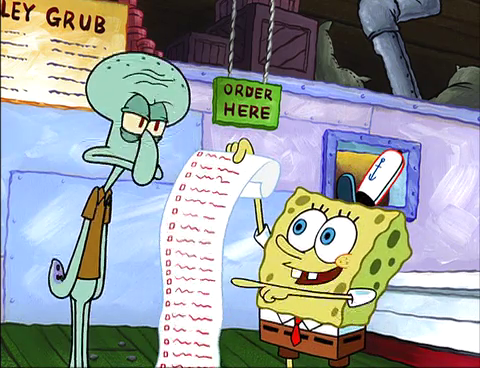 A LIST 1) Perhaps the biggest reason is because I think the first draft is the easiest to take criticism on. As a writer, I know it is a flawed piece. I put in the time and effort to make it, and I love it for what I think it can be, but it's a first draft. It's never going to be good. So even if the feedback comes back overwhelmingly negative, it's not a spear to the gut. It's more of an "yeah, okay, I can see that". No one is ever going to offend me by pointing out where and how a first draft is not good. Quite frankly, I'm often surprised at how much positivity comes back from this round of beta reads. This also ties into my willingness to edit. Imagine, as an author, you wrote something in three months and immediately sent it off to people to review. They come back with a list of things that didn't work for them, maybe some suggestions on how or what to change, and a copious list of your grammatical errors. Your response as you read through is probably "okay, some of these make sense, and like, yeah, I was a little stuck here so I just did XYZ, etc." Now imagine this is your fifth draft, painstakingly crafted through several iterations until you think it is pure refined awesome...and you get the same feedback. Your ouch and oof sensors are going to be going off a bit more. "But I worked so hard on that", you'll say. Or, "I thought that was clever!" You're more attached to the decisions you made, and thus, less likely to want to take any advice or make anymore changes at this point because you've dug into it 5 times!
A LIST 1) Perhaps the biggest reason is because I think the first draft is the easiest to take criticism on. As a writer, I know it is a flawed piece. I put in the time and effort to make it, and I love it for what I think it can be, but it's a first draft. It's never going to be good. So even if the feedback comes back overwhelmingly negative, it's not a spear to the gut. It's more of an "yeah, okay, I can see that". No one is ever going to offend me by pointing out where and how a first draft is not good. Quite frankly, I'm often surprised at how much positivity comes back from this round of beta reads. This also ties into my willingness to edit. Imagine, as an author, you wrote something in three months and immediately sent it off to people to review. They come back with a list of things that didn't work for them, maybe some suggestions on how or what to change, and a copious list of your grammatical errors. Your response as you read through is probably "okay, some of these make sense, and like, yeah, I was a little stuck here so I just did XYZ, etc." Now imagine this is your fifth draft, painstakingly crafted through several iterations until you think it is pure refined awesome...and you get the same feedback. Your ouch and oof sensors are going to be going off a bit more. "But I worked so hard on that", you'll say. Or, "I thought that was clever!" You're more attached to the decisions you made, and thus, less likely to want to take any advice or make anymore changes at this point because you've dug into it 5 times!2) I assume people edit similar to the way I edit. Whether or not this holds true, I can't verify, but I know, if I'm reading a story that is very obviously well put together, I'm more willing to ignore or more likely to miss issues and errors. But if something I'm given has pretty glaring minor errors, I crunch down and get a bit more nitty and gritty with my editing. My hope is that by providing these three readers with the easy and obvious issues that inherently exist inside a first draft it will also make them pay a bit more attention and catch on to bigger issues they may have otherwise missed. Because I never want anyone to come back to me after reading a first draft and just go "It was good." Doesn't help. A first draft inherently has mistakes and weak points, and any reader will notice them.
3) The time in which these people are reading my draft is time in which I will not acknowledge it. Almost every author I've read, talked to, heard speak, etc, has said that once you finish a draft, put it away. Some say for a week, some say for a month. I put it away for as long as it takes at least two of my three readers to finish it. I often give a flexible deadline, because I'm aware that life happens. This usually means it's about two to three months of separation from the story. Long enough that I can forget enough of the finer details to go back in with a fresh set of eyes, armed with restored energy and thoughtful critiques.
I'm not saying that everyone should start yeeting their first drafts at people. It just happens to be a system I've found that works for me. I did it for TOUCHED BY SHADOWS, I'm in the process for doing it with another book I'm prepping for submission, and I'll probably do it with the book I'm working on right now. I'll keep doing it so long as there are people willing to read my first drafts for what they are and offer thoughtful criticism on them and establish a dialogue that helps me craft a better book.
Alright. We've made it to the thank you part of this. I've mentioned that I currently have three readers that each fill a different role. The first is kind of like a hype-woman. Every review is pretty much a rave review when it comes from her. It does wonders for the self-confidence, I'm not gonna lie. Most of her critique comes in the form of asking questions about portions she didn't understand, which really helps me see where I've been too vague, or esoteric, or went down a rabbit hole of jargon understandable only to me and a secret cabal of men without hats. Depending on when her response comes in compared to the others, I'll ask to gauge her thoughts on criticisms that the other two brought up, to get her thoughts on it as well, if it doesn't come up naturally. The second is my middle man, he toes the line of harsh critique and praise. He'll point out where he thinks the story really works, but also point out places that it didn't, picking up threads I may have missed or dropped or tied in a knot. When it comes to bad grammar, it's his pleasure to burn. Almost nothing escapes his eye in that regard. While I may have picked up a lot of it during my own edits, it's helpful to just have it there already so I can focus on the story edits. And last, but certainly not least, the grim reaper of all things bad in my story. She's by far my harshest critic, and she's my girlfriend. She's not mean about it, but she definitely doesn't let me get away with bullshit. At. All. Because she wants me to succeed. She focuses mostly on the story perspective, and how it might (or might not appeal to readers). I often get asked "Okay, but why should readers care about this?", which sounds rough on paper, but I'm the kind of writer who easily can slip into the "people will love this because of the pew-pew cool science-fiction gobbledeegook"...in part because I love the pew-pew cool science-fiction gobbledeegook. And she's never asking me to get rid of the pew-pew...I'm not typing that all again, and none of you better remind me about copy/paste. But it's her way of pointing out that my characters have fallen flat (or that I'm being melodramatic, which also happens). Her questions, while pointed at time, draw attention to where my story is lacking in her opinion (and when I go back and look at it, she's almost alway right, and I don't know how she does it).
So, to the three of you who have chewed through the flavorless gristle of some of my first drafts and have yet to flee from our respective relationships yet, I offer a deep and hearty thank you! I'm not Santa, but if I was, you'd be on my nice list.
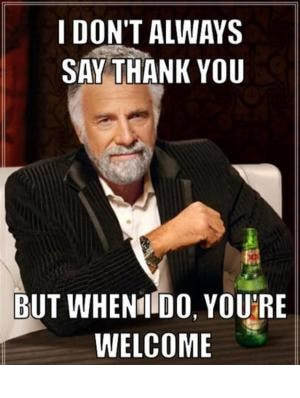 What can they say except, "you're welcome"? During this time in which I've sent my child off in the world to learn it's harsh realities, and have all of its shit dragged into the light, I do what any parent does after sending their child to middle school
What can they say except, "you're welcome"? During this time in which I've sent my child off in the world to learn it's harsh realities, and have all of its shit dragged into the light, I do what any parent does after sending their child to middle school 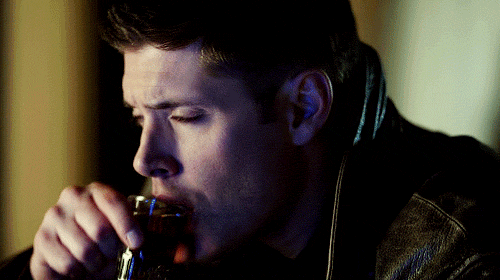 Once I get it back, I work with my Legendary Sannin of Critique Partners to try and get ideas on how to fix up what they've pointed out. And then, I rewrite, and I revise, and I edit, and I rinse, and I wash, and I repeat, until I feel there's nothing more I can do. I start with the big glaring issues that have been pointed out and I jiggle those around independently until I feel like they work. I'll also bounce around and fix any connective tissue that needs fixing in relation to the changed idea. Once all of those are done, I start on page one, and line by line, burn through the story, cleaning, fixing, connecting, and polishing. Usually at least two times. And then when all is said and done, I hide it in a folder on my computer until I feel I can send it out into the even realer world of professional critics who may or may not like it.
Once I get it back, I work with my Legendary Sannin of Critique Partners to try and get ideas on how to fix up what they've pointed out. And then, I rewrite, and I revise, and I edit, and I rinse, and I wash, and I repeat, until I feel there's nothing more I can do. I start with the big glaring issues that have been pointed out and I jiggle those around independently until I feel like they work. I'll also bounce around and fix any connective tissue that needs fixing in relation to the changed idea. Once all of those are done, I start on page one, and line by line, burn through the story, cleaning, fixing, connecting, and polishing. Usually at least two times. And then when all is said and done, I hide it in a folder on my computer until I feel I can send it out into the even realer world of professional critics who may or may not like it.So again, many thanks to my beta readers. Without you, my stories would not turn out the same. Your help and advice is irreplaceable!
Vaughn A. Jackson
Vaughn is a neophyte author of speculative fiction. His debut novel TOUCHED BY SHADOWS will be released via JournalStone publishing on September 24, 2021.
Published on November 08, 2020 15:00
No comments have been added yet.



